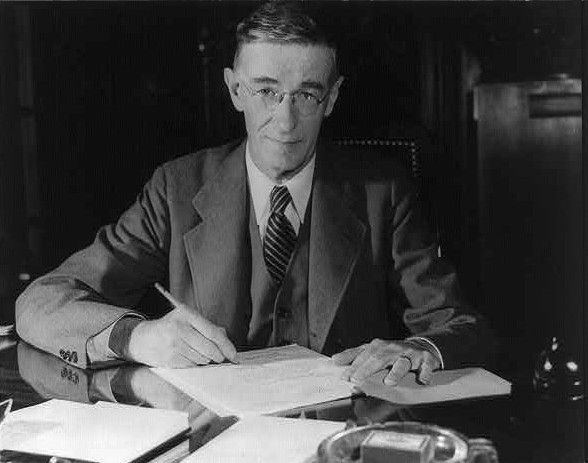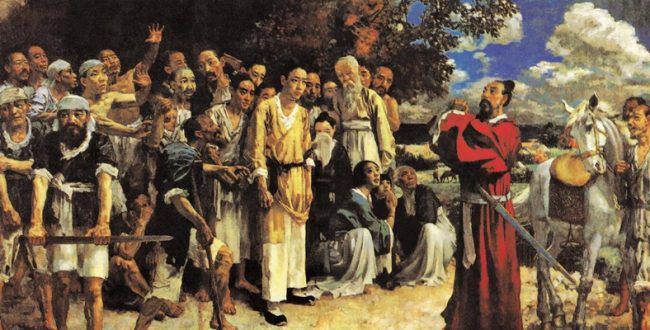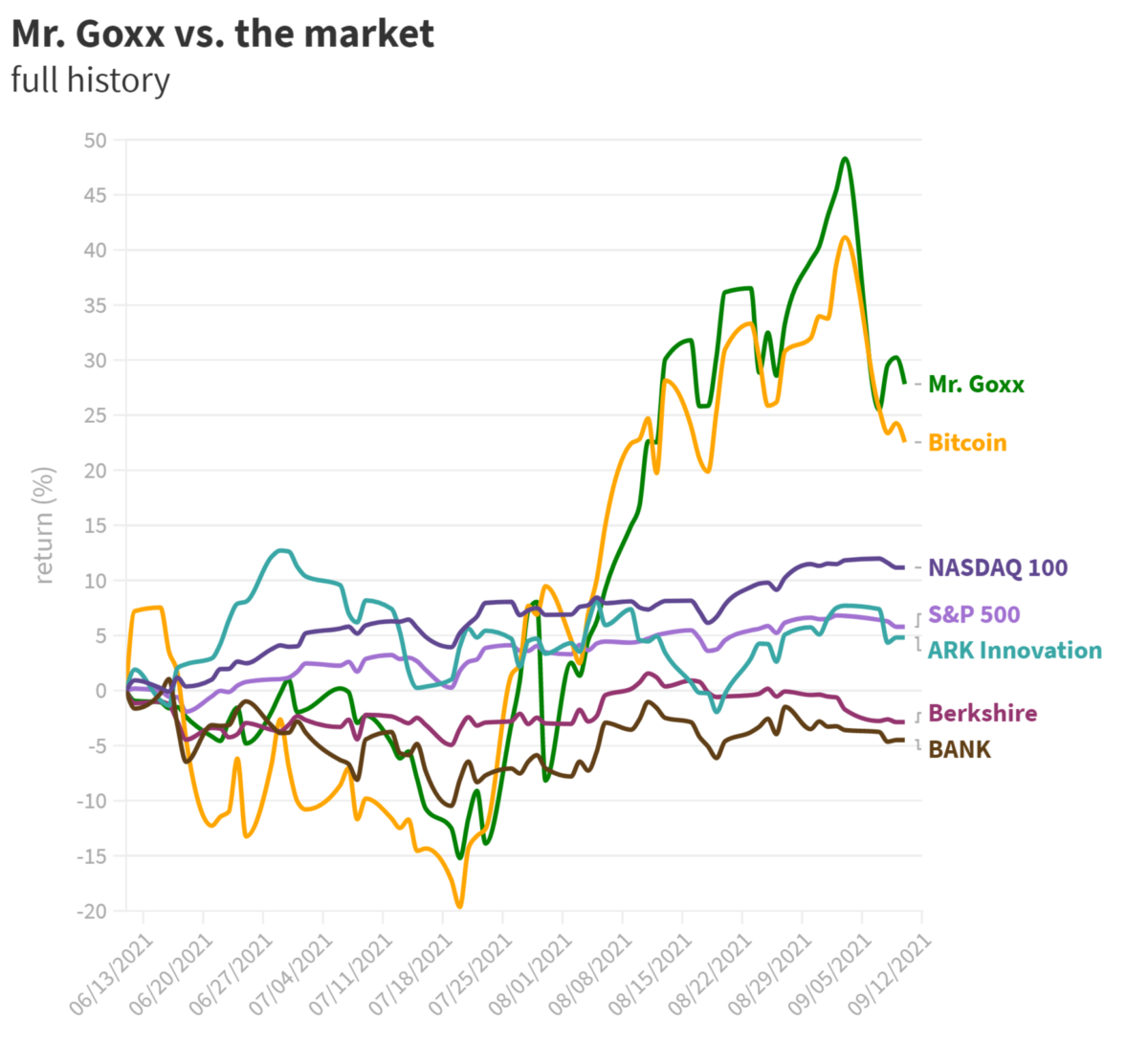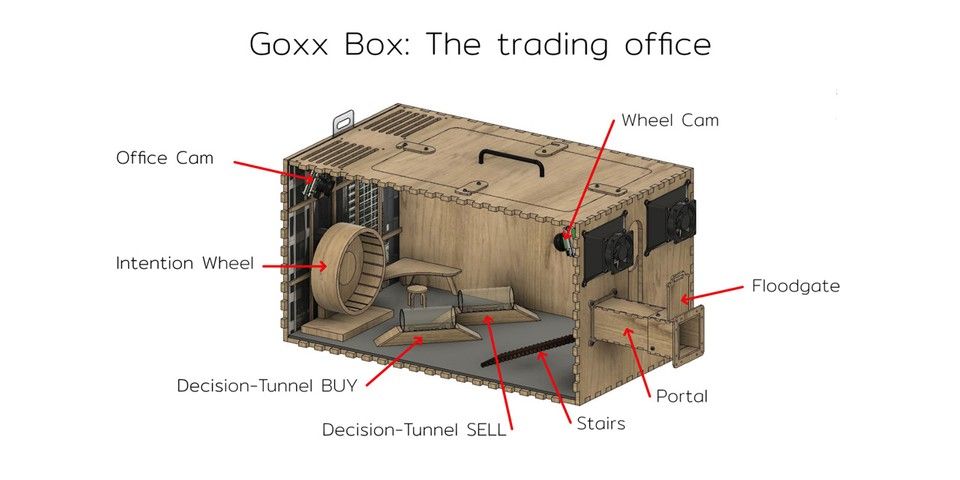Breakfast Notes #3 (The Endless Frontier, Mr Goxx, Venom)

Good morning friends of the Breakfast Notes. Could you do me a big favour and share this with a friend if you enjoyed this?
Quote of The Day. “Concentrate all your thoughts on the task at hand. The sun’s rays do not burn until brought to a focus.” - Alexander Graham Bell on the importance of absolute focus.
#1: The Letter that Made American Science Great🔬
![[Franklin Delano Roosevelt, head-and-shoulders portrait, facing slightly left]. Photograph by photographer Elias Goldensky, c1933. From the Presidential File Collection. Library of Congress Prints & Photographs Division.
https://www.loc.gov/item/96523441/](https://images.unsplash.com/photo-1580128637215-659d70729ad0?crop=entropy&cs=tinysrgb&fit=max&fm=jpg&ixid=MnwxMTc3M3wwfDF8c2VhcmNofDZ8fEZyYW5rbGluJTIwUm9vc2V2ZWx0fGVufDB8fHx8MTYzMzAyMzUxMw&ixlib=rb-1.2.1&q=80&w=2000)
In November 1944, as America was on the cusp of victory against Germany, its president, Franklin Delano Roosevelt, rather than feeling encouraged, was pensive. He was grappling with his mortality as he was suffering from angina pectoris and congestive heart failure.
Under his administration, military technology developed rapidly. From radar technology to the atomic bomb, these scientific breakthroughs happened in a period of war and uncertainty. Yet, the government-funded sciences were lacklustre in improving the lives of the common folk in employment, health and standard of living.
FDR spelt out his aspiration for the American sciences in a short letter to his Director of Scientific Research and Development, Vannevar Bush.
New frontiers of the mind are before us, and if they are pioneered with the same vision, boldness, and drive with which we have waged this war, we can create a fuller and more fruitful employment and a fuller and more fruitful life.
If the deployment of science helped the Allied Forces win World War 2, surely, America could use it to win the war against the ills of cancer and poverty.
The Endless Frontier

In June 1945, two months after Roosevelt's death, Bush wrote a report entitled Science: The Endless Frontier to Harry Truman, the incumbent president. He highlighted the urgent need for basic research.
Consider Bush's words,
Basic research leads to new knowledge. It provides scientific capital. It creates the fund from which the practical applications of knowledge must be drawn. New products and new processes do not appear full-grown. They are founded on new principles and new conceptions, which in turn are painstakingly developed by research in the purest realms of science.
If left to market forces, America's science would not take off. America’s economic and social growth would be stunted. How can the nation rely on profit-seeking firms and philanthropy to fund research to secure America's security, provide economic growth and win the fight against disease? It would be absurd to think that market forces would have thrown up the atomic bomb.
In essence, Bush proposed the following (i) increase public funding for basic scientific research (ii) encourage further private research by revising taxation, and patent laws (iii) facilitate the international flow of scientific research (iv) Focus on training subsequent generations of scientific talent through fellowships and scholarships.
Bush's report also detailed the structure of a new national research system that would later see the explosion of American Science through institutions such as the National Science Foundation (NSF), National Aeronautics and Space Agency (NASA) and public universities.
In the decades since, the government poured billions of dollars into public science research that helped America land its first man on the moon, spawn important inventions such as pacemakers, GPS, personal computers and the internet. The positive externalities generated by public-funded research would be almost impossible to quantify, just as it would be equally impossible to think that modern science would be possible without NSF funding.
The Key Takeaway. Bush was an engineer of luck. He made the most of his luck as a scientist involved in America's wartime development. He leveraged his capacity to ensure that innovation could continue to develop in peacetime, preventing science from 'falling flat on its face'. It’s good to be lucky, it’s even better to use that luck to expand the common good.
Visualization Of The Day 🖼️

Tian Heng and 500 Heroes” (1930) depicts Tian Heng, a nobleman of the Qi State, bidding farewell to his followers after agreeing to submit to the conqueror Liu Bang in exchange for his followers’ lives.
Liu Bang was worried that Tian would harm him later, so he issued a decree: If Tian Heng surrendered, he would be made a prince or marquis, but if Tian did not surrender, the Emperor would send soldiers to exterminate everyone on the island. To save their lives, Tian Heng left the island and made his way to the capital.
However, thirty miles from the capital, Tian Heng committed suicide. As he wished, his subordinates carried his head to see Liu Bang, showing that he would never surrender to him but was willing to kill himself, to save the rest of the islanders.
Moved, Liu Bang buried Tian as a prince and sent people to bring his five hundred followers back but when they heard of Tian's suicide. Tian's followers plunged into the sea and committed mass suicide out of unyielding loyalty to their leader.
Through the dejected eyes of the followers, Xu wanted to highlight that his followers likely knew Tian was never going to surrender to Liu Bang and were readying themselves to die.
Xu had been disillusioned at the ruling Kuomintang’s lack of effort in resisting the Japanese. His subject in this painting, Tian Heng was taken from Shiji (The Records of The Great Historian) by Sima Qian, reflected his desire for courageous leadership in the face of overwhelming odds and peril.
#2: The Magic of Mr Goxx🧝🏻♂️

Mr Goxx, a successful executive, operating out of Germany, has been crushing it on the crypto market. So far, his lifetime performance is up about 20%- beating many professional traders and crypto funds. He has been so successful that even Elon Musk shouted him out on Twitter for having 'mad skillz'
- The Catch. He is a hamster.
A Peek Behind The Curtain

Its owners created a fully automated cage office that would turn Goxx's actions into market decisions. They even placed a camera inside the Goxx Box for people to watch a live stream of him in the office.
Now, Mr Goxx has his own NFTs.
The story of Mr Goxx teaches two interesting lessons.
First, A Random Walk Down Wall Street might just hold. As popularized by Burton Malkiel of Princeton, the random walk theory posits that by and large, a share price in the short and mid-term moves seemingly at random just as how a drunk would waltz down Wall street in an erratic fashion. There is no clear identifiable pattern which one can analyze, and any ‘correct’ analyses might as well be guesses. However, the theory does not deny that investors can reliably predict long-term values.
Second, scrutinize the survivors. For every Mr Goxx, there are likely to be many dead trading Neopets that wallow in obscurity. After all, we have no idea who were his fellow animal traders. As a result of the media machine, we only hear about Mr Goxx.
How many animals were outfitted with these prediction rigs in the first place? We have no clue. As a result, many of us commit the logical error of concentrating on the people/things/hamsters that have made it past the selection process of crypto profitability and neglect those that did not. This is known as ‘survivorship bias’. If we are not careful, this bias might lull us into exaggerated optimism that can spiral into failure.
The Key Takeaway. Be wary of gurus. Anytime a guru tries to sell you a course guaranteeing you a surefire way to earn millions through stocks. What should you do?
Run Far!
- First, they are more likely to be lucky than wise. If they were earning all that cash through high-quality information about stocks, why would they erode their competitive advantage by selling it to you? Remember, big trading firms enforce no-compete clauses religiously. (Now why is that?)
- Second, they will never show you their failures, and they will praise their 'proprietary system' and happily collect your money. Any losses you make, that's your fault for not implementing their lessons well.
#3: When Is The Best Time To Release A Movie?🎦
This is the billion-dollar question that Hollywood execs are trying to solve. For a movie to be profitable, the revenue generated from cinemas worldwide must exceed the costs incurred in filming the movie.
In the past, it was way easier. Time it during the holidays when families are the freest and children have no homework to rush through.
Now, the rise of streaming and COVID-19 has completely disrupted the art and science of timing a movie.
When cinema-goers only have 45 days to watch a movie on the silver screen once in their whole life, timing its release almost becomes everything.
In this interesting article, Julia Alexander of Parrot Analytics breaks down Venom 2's release dilemma. The essay she wrote outlines the following criteria films need to meet for a studio to trigger a theatrical release.
They are:
- Is the talent's star power enough to get people out to see a movie with their masks on and pay for a ticket?
- Similarly, is the narrative or franchise in-demand enough to compel people to see it immediately and will pay to do so at a theatre?
- Are there more people going to the cinema now, or are people still camping at home?
- Does the movie necessitate a big-screen experience, or would consumers be happy watching it from their iPhone, iMacs or iPads?
- Can this movie wait another six months to a year?
Alexander's point is that by seeing how Sony execs answer these questions through their release of Venom. This installation of Venom is the perfect litmus test to understand the movie industry’s current trajectory. (You have to read the full article!)
The Key Takeaway. The reality is the moment a movie premieres, its value instantly depreciates. This is why the media tracks the box office weekend earnings and why movie studios would spend millions of dollars flying their stars all over the globe and making sure they answer the same press questions in as many different ways as humanly possible. The aim is to generate as much interest as possible for people to watch the movie the moment it premieres. Suppose the movie debuts well; congrats on the flywheel of interest to make the next 44 days a very prosperous one. If not, at the very least, a strong opening weekend would have helped you cut some losses.
Thanks for reading! See you next week and remember to stay fresh!
Got feedback? Email me at keithyap95@gmail.com. Tell me, is the length too long, too short or just nice?